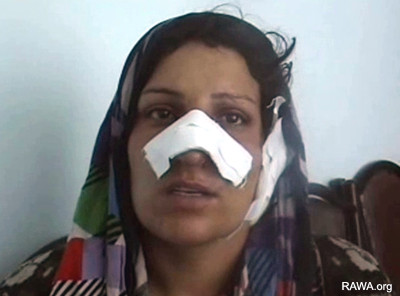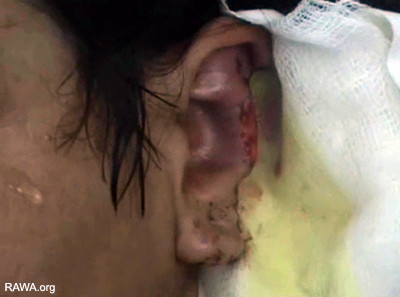By Terri Judd


RAWA, February 15, 2008: Nafisa is hospitalized with her child in a local hospital in Herat province in Western Afghanistan. She says her husband attacked her like a hungry tiger and bat her nose and then cut off her ear by a knife.
Grinding poverty and the escalating war is driving an increasing number of Afghan families to sell their daughters into forced marriages.
Girls as young as six are being married into a life of slavery and rape, often by multiple members of their new relatives. Banned from seeing their own parents or siblings, they are also prohibited from going to school. With little recognition of the illegality of the situation or any effective recourse, many of the victims are driven to self-immolation – burning themselves to death – or severe self-harm.
Six years after the US and Britain "freed" Afghan women from the oppressive Taliban regime, a new report proves that life is just as bad for most, and worse in some cases.
Projects started in the optimistic days of 2002 have begun to wane as the UK and its Nato allies fail to treat women's rights as a priority, workers in the country insist.
The statistics in the report from Womankind, Afghan Women and Girls Seven Years On, make shocking reading. Violent attacks against females, usually domestic, are at epidemic proportions with 87 per cent of females complaining of such abuse – half of it sexual. More than 60 per cent of marriages are forced.
Despite a new law banning the practice, 57 per cent of brides are under the age of 16. The illiteracy rate among women is 88 per cent with just 5 per cent of girls attending secondary school.
Maternal mortality rates – one in nine women dies in childbirth – are the highest in the world alongside Sierra Leone. And 30 years of conflict have left more than one million widows with no enforceable rights, left to beg on the streets alongside an increasing number of orphans. Afghanistan is the only country in the world with a higher suicide rate among women than men.
Campaigners say these are nationwide figures but in war-torn provinces, such as Helmand, the British area of responsibility, oppression is often worse, though the dangers make it impossible for them to monitor it accurately.
The banned practice of offering money for a girl is still rampant – along with exchanging her as restitution for crime, debt or dispute. With the going price for a child bride at £800 to £2,000 – as much as three years salary for a labourer – many grooms are forced to take loans or swap their sisters instead, explained Partawmina Hashemee, the director of the Afghan Women Resource Centre.
Mrs Hashemee, who has fought for the rights of her fellow Afghan women, initially for refugees in Pakistan, for almost 20 years, said: "For me the issue that breaks my heart is the forced marriages because of poverty – even girls as young as eight. They don't get to go to school or to go out. They are told 'you are not allowed to visit your family, we paid, now you have to work'."
In 2007 a law was passed banning marriage under 16, but Mrs Hashemee said: "The majority of people are not even aware of it. Early age marriages are increasing."
The vast majority of international aid goes directly to the Afghan government rather than non-governmental organisations. Activists are calling on the British to ring-fence some of the funding for human rights issues – such as gender-based projects – and to ensure the money reaches appropriate beneficiaries.
Mrs Hashemee said, in Kabul at least, there had been greater recognition of women's rights over the past seven years as well as major civil and political gains since the fall of the Taliban. But it remains a dangerous environment and female MPs, activists and journalists still live under constant threat of death.

RAWA, Feb.3, 2008: A man in Mazar-e-Sharif killed his two wives with an axe.
Womankind is calling for the implementation of UN Security Council Resolution 1325, which says women in conflict zones should be offered protection and recognition of their role in the peace process as well as their human rights. Across Afghanistan women's organisations, such as Mrs Hashemee's, are now turning their attention from providing basic needs to empowering females, teaching them their rights and urging them to vote.
Often illiterate women are instructed on how Islam views women as equal. Training is offered to young men in why sexual abuse is wrong. Communities are being "mobilised" to fight for and monitor women's rights – encouraging mullahs to promote the equality that the Koran teaches.
But there are no women's rights associations in Helmand. The closest is one courageous group working in another southern province, Kandahar. Yet Mrs Hashemee is positive. She said: "I don't want to be disappointed. We will struggle on and hopefully the government and international community will help."
In a report this month the chairman of the International Development Committee, Malcolm Bruce MP, said: "There is a dangerous tendency to accept in Afghanistan practices which would not be countenanced elsewhere, because of 'cultural' differences and local traditions.
"We believe that the rights of women should be upheld equally in all countries. The government of Afghanistan has a vital role to play in this by ensuring that the international human rights commitments which it has made are fully honoured and given greater priority."



